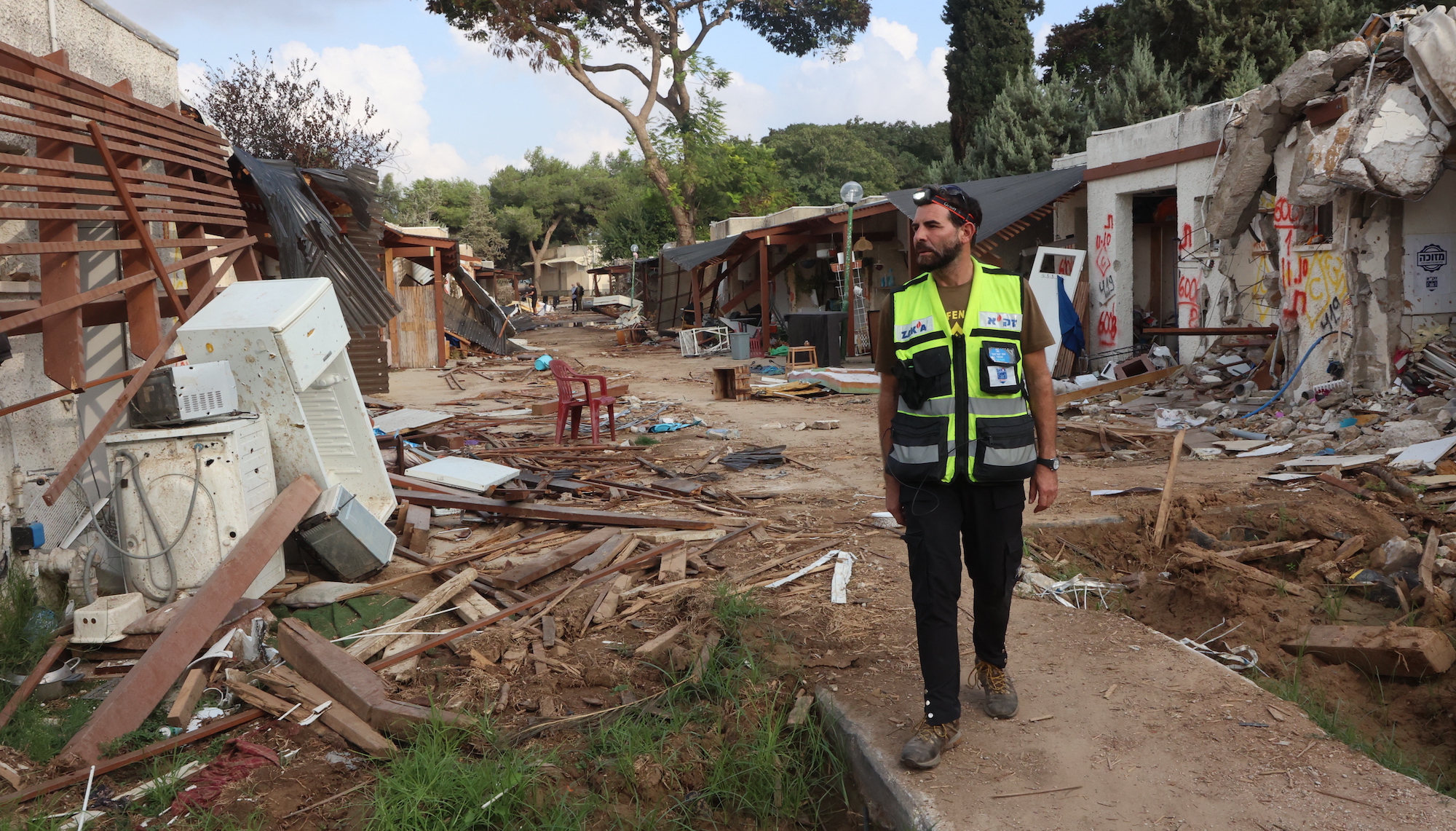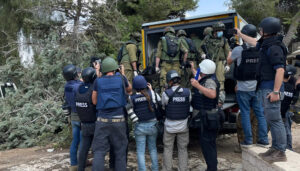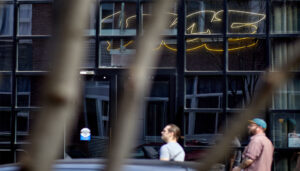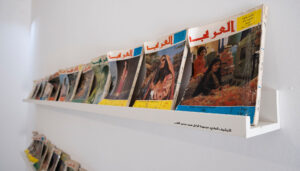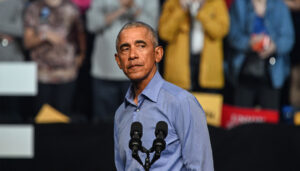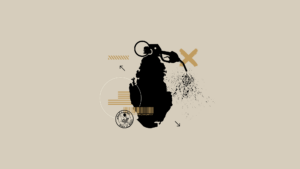
On July 31st, 2007, after nearly two and a half years of preparations, ATV’s management held a press conference to announce its long-awaited official launch on the next day. During the press conference, the transmission on Nile Sat was suddenly halted by the Audio Visual Commission (AVC), who sent ATV an official letter that afternoon informing them that the licensing and paperwork was incomplete. The letter also stated that were not allowed to transmit until all the requirements demanded by AVC, were met.
Since that day, the media has cited a series of correspondence between ATV and AVC, with no resolution on the horizon, and no sign that ATV will be on air anytime soon.
However, only a few days ago, in a surprising development to the ongoing media saga, ATV announced that some of its content would be available online through Ikbis.com. While this is not an alternative to its pending transmission, it has given internet audiences a taste of what ATV has in store.
7iber.com talks to ATV Director Mohannad Khatib on the current dispute with the Audio Visual Commission and what might lie ahead for the channel.
When you were first informed that some requirements are not met, was that the case? Did you have to submit new paperwork?
MK: The AVC said that our links are not licensed, so we sent them the license. They said that we didn’t inform them beforehand of the frequencies we were using, so we sent them that information. [It was] very obvious that things were already there and in place.
When did you get the license?
MK: We got it in 2005, from the AVC. We have two separate licenses that have nothing to do with each other; they’re mutually exclusive. We can use either or both. The terrestrial is the one that’s problematic, because it’s connected to Jordan Television (JTV). We had signed an agreement with JTV to use Channel 2. It was supposed to be activated in May 2006, and for several reasons it wasn’t. We never used channel 2 during the past year, and JTV uses it until this point. Now, JTV is asking us for fees in return of having used it this past year. It’s like paying rent for a house where someone else lives. It doesn’t make sense. Contractually, they may have a point, because we have a signed contract.
Did this issue pop up after your transmission was stopped?
MK: JTV had been asking for its money before, but my main point is that the terrestrial transmission is one thing and the satellite is another. You cannot link them together, and the Audio Visual Commission is linking them. The last thing they told us was “settle your dispute with JTV and we’ll let you start your satellite transmission.” The AVC have no legal jurisdiction over this, we have an agreement with JTV. If there is any dispute between us, there is a clause in the agreement stating that the Amman Court is the legal entity that looks into it. The AVC is replacing the court, which is absolutely illegal, while acting as a collection agency for JTV. They have a specific regulatory mandate that they should stick to.
The letter sent by the commission on July 31st stated technical paperwork that was not in place, to which we responded immediately with what they asked for. Copies of licenses, agreements, receipts and microwave links information. Then they sent us a letter asking for information on the programs that will be aired, with a summary on each as well as names of producers and presenters. We had sent them our program grid before, but we re-sent it with all the detailed information.
Then, we received a letter from the AVC asking when we were due to start our terrestrial transmission, and requesting the grid for terrestrial programs. Our terrestrial and satellite transmissions have the same content, but now we’re being told that they’re supposed to be different, which doesn’t make any sense.
The last thing I sent them was dated August 26th, saying that AVC is not entitled to look into the disputes between us and JTV, and that they can’t act as a collection agency for JTV. We have completed all the technical requirements and frequency licensing. I told them we have the legal right to start broadcasting, irrespective of terrestrial channel issues. This is in accordance to the license given to us by AVC, and I reminded them that any linkage between the satellite and the terrestrial licenses is a violation of the signed agreements.
How has the dispute affected the channel thus far?
MK: We are losing a lot of money everyday. We had commitments to many entities, especially for Ramadan. We bought six soaps costing around 2 million JDs. All gone to waste now, because even if they tell us we can broadcast tomorrow, it’s too late for us to market any of these, Ramadan is one week away. So we’re in an awkward position. More importantly, we have 330 employees who are sent home on paid leave. We extended their leave, but they’ve been off for two weeks now and they’re coming back on Sunday. There’s still no work and most probably I’ll have to extend their leave again.
What was the commission’s response to your last letter?
MK: They haven’t replied yet. I haven’t heard anything from them since sending that letter on the 26th.
Who were the other investors, besides Mohammed Alayyan?
MK: He is the sole owner. He turned the company into a public shareholding company, but stocks are not on the market yet. The idea was to start a project that anyone can invest in. There were some strategic investors with whom negotiations took place, and who agreed to join, all Jordanians.

Tell us about the decision to put some content on Ikbis.
MK: We’ve put some of our content online recently. It’s not a substitute to our TV broadcast, it’s complimentary. We were going to do it anyway once we start. We approached Ikbis, because a friend of mine told me about it and I liked the idea. The things on Ikbis are just a sample of our programs, but we are thinking of expanding the grid of programs we provide there, and perhaps even do a 30-minute daily news segment.
How much of an impact do you think this has?
MK: You’d be surprised, and you probably know better than I do that, there is good traffic on these websites. Not huge traffic, but people are starting to see it more. Recently I’ve become more aware of all the New Media developments happening here, and it’s very interesting.
It’s also important for me that the young people who have done all this work with ATV get the chance to see their work out there, available for the public. The morale here is very low this past month. Everyone working here was very excited about the launch, and then all of a sudden, they were all let down.
Feedback has been very good. From outside ATV we’ve been getting a lot of support and people seeing our work and realizing what we’ve been doing. And internally, people have been happy to see a channel for their work to be out there, even if it’s not on air.
How true is it that there are negotiations with ART?
There are no negotiations with ART. Even if there is a buy-out, which is something that can happen in any business, the operation doesn’t stop. If as a business person, you’re offered double the amount of money you invested, you would sell, but that doesn’t mean the operation stops.
I don’t think it’s a solution. There’s no problem with it if someone wants to invest in this project or be a partner, the main problem is why our transmission has been stopped.
As far as my mandate with ATV goes, I deal with the official channels: the AVC and the telecom regulatory commission (TRC). We also have an agreement with the media city as they link us to Nile sat. These are the people I deal with. If there are investors or people interested in buying, the Chairman and project owner deals with that, but this does not affect the operation. We can’t stop an operation that we’ve been working on for two and half years, spending millions, and employing 330 people who support families.
We’ve partnered with many local TV producers whose business wasn’t doing well before. TV industry in Jordan was dead, there was only one big company working well, and that is the Arab Telemedia Center. The rest were almost insignificant, but we started working with them, and we’ve refreshed the TV industry in Jordan. Then a bureaucrat comes and decides not to allow us to transmit.
Don’t you think that it is not simply bureaucracy? Do you feel there’s something behind it?
MK: I wish someone would come and tell me what the reasons behind it are. All the reasons we were given don’t make sense.
I think there are many elements; I’m totally convinced that content has a lot to do with why they stopped us. We’ve been transmitting internally for six months, with news bulletins and shows, commercial breaks, promos, everything. I’m sure that some entities got to know what we were broadcasting and didn’t feel comfortable with it. We’re a bit more outgoing than they’re used to, and we’re definitely different from JTV. I hope we will never be like JTV, and if that is their standard then they will never let us air.
We have quick, daring content and very good news coverage. We do breaking news. We have three SNG cars that can go all over Jordan quickly and get a story from anywhere. If this doesn’t suit them, let them say it straight out, let them say that they don’t like the content.
The second element in my opinion is JTV. I think they wanted to save JTV in Ramadan. Now that Ramadan is one week away, we can’t start broadcasting in the middle of Ramadan. Now it’s a dead season for us because it’s too late to do anything. For JTV, Ramadan is a major source of revenue. They probably figured they can make a few million JDs without competition.
How long are your employees going to remain on paid leave? How long will you sustain this?
MK: I honestly don’t know, but not very long. No one can pay large monthly salaries without a source of revenue.
Do you have an ultimatum?
MK: There is no ultimatum now, we’re taking it day by day, but a point will come when you have to cut your losses. I hope it wouldn’t come to that, but you never know.
Has anyone resigned?
MK: Many people are looking for jobs elsewhere, not because we’re not paying them (last month we paid a week in advance, but), but because they’re bored, and they want to see the fruit of their labor.
I think that this whole issue has been very poorly managed by the authorities, I think that the management was extremely silly and haphazard, and I think that decisions have been made by people who really have no idea what is going on. Such issues are not dealt with this way. It is extremely bad for the image of the country. What they did is tarnish the image of the country – knowingly or unknowingly. Anyone who wants to invest in media in the country will think 20 times before coming near Jordan.
So what’s next?
MK: This is a big question. I think personally that it’s time to consider other options. We didn’t want to escalate the issue, and tried to resolve it in a civilized way. I really don’t understand how a government entity takes a decision to prevent broadcasting, stopping the biggest media project in Jordan’s history. It’s not like newspapers and radio stations; you’re talking here about a high standard TV station, in which a lot of money and effort was invested. For it to be stopped this way by a bunch of bureaucrats who don’t know what they are doing is frustrating.
The details of this whole issue are even more disturbing – I get this letter ordering us not to broadcast, signed by Faisal Al Shboul, who is the general director of JTV. The head of engineering at the AVC is an employee at JTV, there is a clear conflict of interest. I don’t understand how this can happen in a civilized country like Jordan when everyday we hear high ranking officials telling us about progressive free media.
I think we have three options: we have legal channels, we can resort to courts, but this would take a long time. Maybe this will be the only option.
We can challenge the authorities, and broadcast from outside Jordan. Since the problem started, we’ve been approached by many carriers and providers saying that they would help us come out from Dubai or anywhere else. We can do that. (However) at the end of the day, this might cause more problem if the signal goes out from our rooftop to some other country in order to broadcast.




